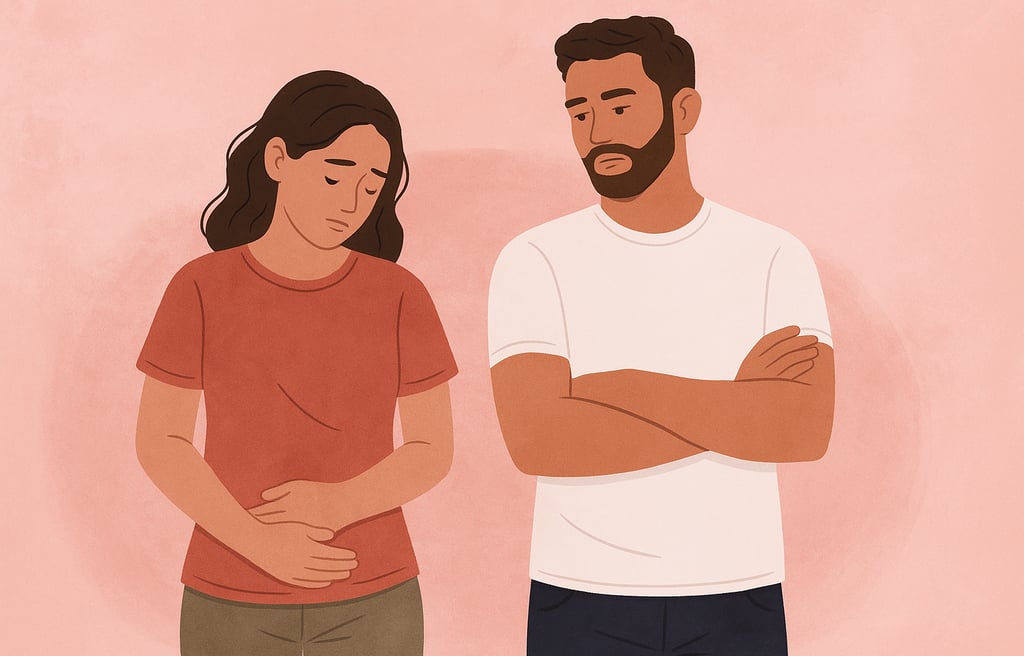Does BMI Affect IVF Success?
Learn how BMI influences IVF outcomes and NHS access to fertility treatment. A sensitive, science-based guide to weight, fertility, and reproductive care.
WELLNESS & FOOD


If you’re preparing for IVF, you may have already heard the term BMI (Body Mass Index) come up in appointments or clinic information. It’s one of the most frequently cited factors in fertility eligibility — especially within the NHS system — but it's also one of the most emotionally loaded.
This post aims to explore the connection between BMI and IVF with honesty, care, and context. No shame. No scare tactics. Just facts, sensitivity, and support.
What Is BMI and Why Do Clinics Use It?
BMI is a calculation based on your height and weight. It’s a simple tool used in many areas of healthcare to screen for potential health risks.
The general BMI categories are:
Underweight: under 18.5
Normal weight: 18.5–24.9
Overweight: 25–29.9
Obese: 30 and above
In fertility care, BMI is used to assess:
Hormonal balance and ovulation
Risk during pregnancy
The body’s response to IVF medications
Egg retrieval safety (especially under general anaesthesia)
But here’s the reality: BMI isn’t perfect. It doesn’t account for muscle mass, genetics, metabolic health, or body composition — and it doesn't always reflect someone's readiness for treatment.
Does BMI Affect IVF Success Rates?
Research shows a U-shaped curve when it comes to BMI and fertility — meaning that both a very low and a very high BMI can potentially reduce IVF success rates.
High BMI (over 30) may be linked to:
Reduced response to stimulation drugs
Lower egg yield and egg quality
Increased risk of miscarriage
Slightly lower implantation and live birth rates
Higher chance of complications during pregnancy
Low BMI (under 18.5) may also impact:
Hormone production (especially oestrogen)
Irregular ovulation
Poor endometrial lining development
Higher risk of preterm birth
That said, many people with higher or lower BMIs go on to have successful IVF — especially when their general health, nutrition, and hormonal balance are supported.
NHS BMI Limits for IVF
In the UK, BMI restrictions are common in NHS-funded IVF — although policies vary by region (also called Clinical Commissioning Groups or CCGs).
Most NHS fertility services require:
A BMI under 30 for women
A BMI under 35 for men in some areas
Some regions may allow up to BMI 35 for women, but this is less common
This can feel frustrating and exclusionary — especially if you're otherwise healthy, or if you’ve already been trying for years. Private clinics tend to be more flexible but may still recommend adjustments based on medical risk.
A Sensitive Note on Weight, Shame & Fertility
It’s one thing to be aware of BMI as a clinical factor. It’s another thing entirely to feel blamed for your body while going through something as emotional as infertility.
Here’s what we want you to know:
Your body is not failing you.
You deserve care, respect, and compassion at every size.
Small, sustainable changes can support hormone health — without crash dieting.
Weight is one part of the picture — not the whole story.
How to Support Fertility at Any Size
Instead of focusing on BMI alone, consider the underlying health markers that truly matter for fertility:
✅ Balanced Blood Sugar
Support with whole foods, fibre, and regular meals
Avoid restrictive diets that can stress the body
✅ Stable Hormones
Work with your clinic or GP to monitor oestrogen, progesterone, thyroid, and androgens (especially in PCOS)
✅ Regular Movement
Gentle exercise (like walking, swimming, yoga) improves circulation and insulin sensitivity
✅ Sleep + Stress Support
Both affect weight, hormone balance, and inflammation
You Are More Than a Number
BMI may be part of your IVF conversation — but it should never be the whole conversation. Your body is capable of incredible things, and fertility is complex, not linear.
Whether you’re just starting out, trying to qualify for NHS treatment, or navigating private care, know this: You are worthy of support, kindness, and options.
If you’ve been made to feel dismissed, ashamed, or unheard — it’s not your fault. There are clinicians and communities who will treat you with the dignity you deserve.
© 2025. All rights reserved.
